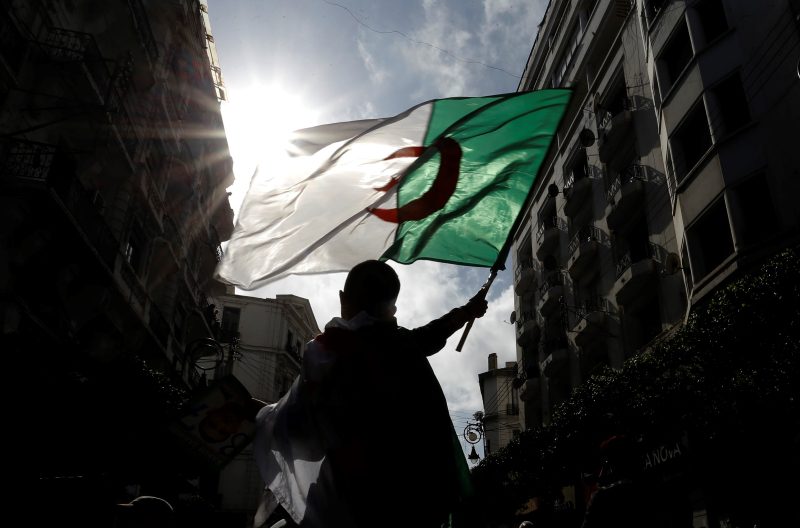Despite the undoubted success of the Abraham Accords, Antisemitism still flourishes across much of the Middle East and North Africa, e.g. Algeria. Indeed, the growth of Algerian Antisemitism is, at least in part attributable to the success of those accords because they now regional politics these accords furnish the pretext for rising Antisemitism that masquerades as a defense of Algerian interests against Morocco. In fact, this Antisemitism builds upon a long tradition in Algeria and the Arab world that predates the formation of the state of Israel but that greatly expanded due to the century-long conflict between Arabs and Jews over the destiny of the land of Israel.
The examples of the Algerian government’s hysteria on this subject abound. In 2020 the government denounced members of the European Parliament as “Zionists,” because they protested Algeria’s violations of human rights. More recently, in 2021 Algerian soccer players cas was suspended for refusing to face an Israeli opponent. However, obviously this Antisemitism occurs in more serious venues as well. Thus, when the African Union granted Israel observer status in 2021, Algeria, among other members, protested so loudly that this decision contradicted the Union’s previous pro-Palestinian resolutions that the union eventually had to suspend debate on the issue, thereby nullifying its previous decision. Naturally, Algeria celebrated this decision as a great victory.
As noted above, the roots of this Antisemitism represent the commingling of historic Arab Antisemitism, itself, in no small measure a product of Western Antisemitism transplanted into a new colonial and imperial project in Algeria with state rivalries once that colonjalism ended. In Algeria’s case the protracted rivalry with Morocco over the Western Sahara has come to drive much of its foreign policy, including its rapprchement with Russia, and this Antisemitism. Whereas Morocco apparently now believes it is gaining international support for its position that the Western Sahara belongs to it; Algeria evidently again has become increasingly embittered about Morocco’s ties with the West, including Israel, and has become increasingly pro-Russian an anti-Western. As a result, it has taken up Russia’s cause in Mali against France, and has again manifested its support for Hamas against Israel. In similar fashion, Algerian authorities therefore claim that Israel is helping to plot separatist attacks from the minority Kabylie (MAK) population there in concert with Morocco. They likewise, claim that Israeli and Moroccan-backed groups are responsible for setting wildfires in Algeria.
Finally it also seems apparent now that Algeria will gravitate towards Iran whose relationship with Morocco has always been rocky, not least because of Iran’s support for the Polisario Front, the independence movement in the Western Sahara. The Israeli-Moroccan rapprochement that also evidently includes potential arms sales from Israel also evidently figures in this Iran-Algeria partnership because there are reports of an impending joint Israeli-Moroccan base near Melila in Morocco.
These examples of Moroccan-Israeli partnership clearly affect Algerian foreign policy. And politics, Algeria’s readiness to translate political tensions with Israel into a more pervasive Antisemitism underscores a rather darker and pervasive global issue. Algerian policy exemplifies the broader and more general process by which competing political interests become ethnicized and racialized to the point of demonology. Algeria’s Antisemitic policy ensures that the competition for influence in North Africa is now laced with animosities for Morocco and Israel that cast them as devils with whom no understanding is possible. It therefore seems as if for Algeria every issue in African politics, including its quarrels with France over Mali and its rapprochement with Russia is somehow connected with the West’s failure to recognize the rightness of Algiers’ cause in the Western Sahara. These twin processes of demonizing political rivals and of commingling all its outstanding grievances together with a heightened and ethnicized emotionalism will make it extraordinarily difficult for Algeria to make any satisfactory process on those issues that actually seriously affect its vital national interests.
This also likely entails the erection of further roadblocks to peace on these and other issues in North and West African issues, e.g. Mali’s civil, violence, Libya’s civil war, and overriding other Middle Eastern issues, the struggle between Iran and Israel that is playing out across the region. But beyond the Middle East Algeria’s conflation of political competition with Israel with Antisemitism underscores the deeper reality of the rising tide of this, the so called oldest hatred and one that transcends both the political left and right, grows today and is focused not on what the state of Israel does but on the fact of its existence as a Jewish state. Unlike Morocco who has reached out to make peace with Israel and facilitate a broader Middle Eastern and North African peace, Algeria remains consumed by its self-concocted fears and hatreds. As long as that remains the case it will have neither peace nor security.
Stephen J. Blank, Ph.D., is Senior Fellow at FPRI’s Eurasia Program. He has published over 1500 articles and monographs on Soviet/Russian, U.S., Asian, and European military and foreign policies, testified frequently before Congress on Russia, China, and Central Asia, consulted for the Central Intelligence Agency, major think tanks and foundations, chaired major international conferences in the U.S. and in Florence; Prague; and London, and has been a commentator on foreign affairs in the media in the U.S. and abroad. He has also advised major corporations on investing in Russia and is a consultant for the Gerson Lehrmann Group. He has published or edited 15 books, most recently Russo-Chinese Energy Relations: Politics in Command (London: Global Markets Briefing, 2006). He has also published Natural Allies? Regional Security in Asia and Prospects for Indo-American Strategic Cooperation (Carlisle, PA: Strategic Studies Institute, U.S. Army War College, 2005). He is currently completing a book entitled Light From the East: Russia’s Quest for Great Power Status in Asia to be published in 2014 by Ashgate. Dr. Blank is also the author of The Sorcerer as Apprentice: Stalin’s Commissariat of Nationalities (Greenwood, 1994); and the co-editor of The Soviet Military and the Future (Greenwood, 1992).






